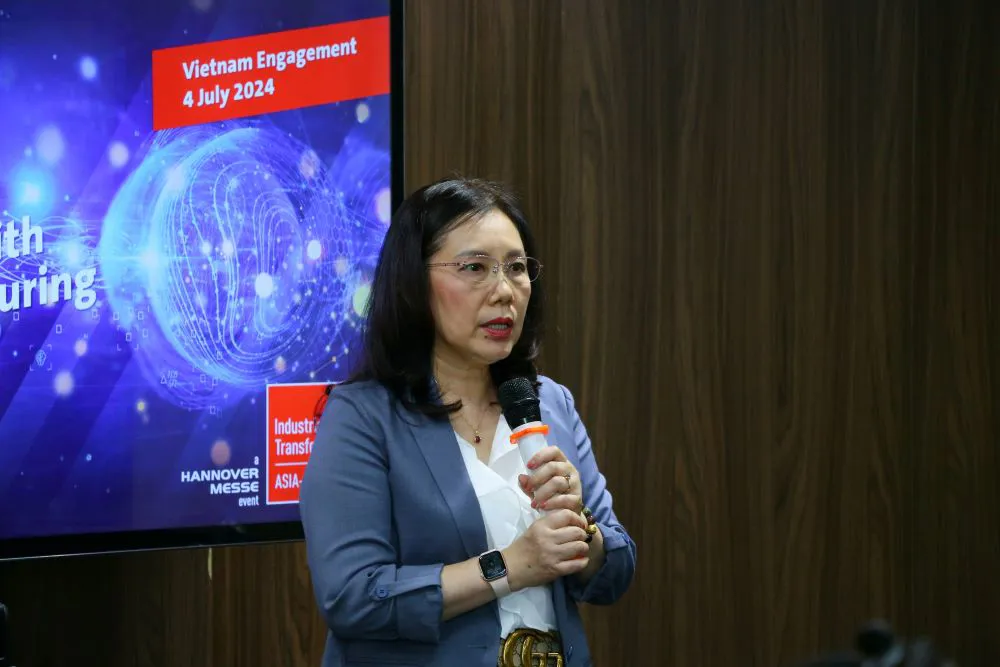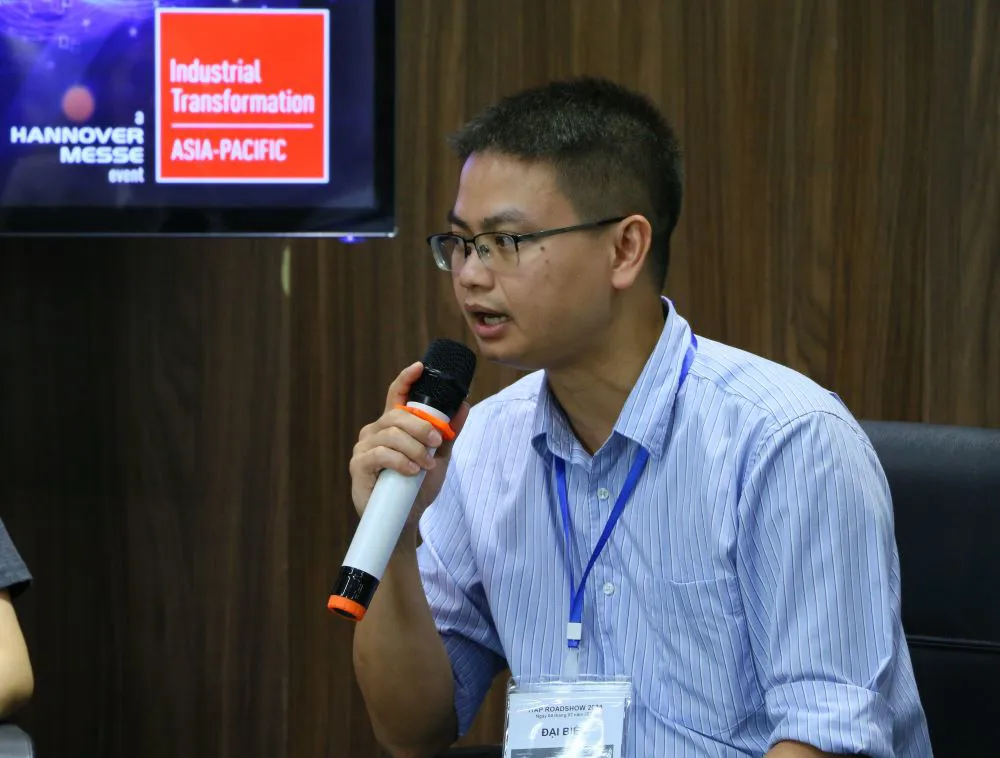AI matters to Vietnam’s growth amid global trend
The government of Vietnam has approved a national AI strategy that will allow the country to become a regional center for AI innovation and solutions by 2030.
At the Industrial Transformation ASIA-PACIFIC (ITAP) event in Singapore from October 14-16, 2024, AI is expected to be highlighted as a key driver for Vietnam’s growth, particularly within the electronic and manufacturing sectors.
The Vietnam Electronic Industries Association (VEIA), representing major electronics manufacturers, played a significant role in showcasing the country’s advancements and potential in AI integration.
| Do Thi Thuy Huong, Hanoi-based VEIA’s Executive Board Member. Photos: VEIA |
To view how the ITAP, a Hannover Messe event and a strategic platform that evolves with the industry, significant to Vietnam’s businesses in AI application, Do Thi Thuy Huong, Hanoi-based VEIA’s Executive Board Member, gave The Hanoi Times some important undertakings.
Do Thi Thuy Huong, an Executive Board Member of the Vietnam Electronic Industries Association (VEIA), emphasized the critical role of AI in enhancing the competitiveness and growth of Vietnamese businesses. She advocates for the integration of AI in various sectors, particularly manufacturing, to improve efficiency and innovation.
Huong noted that AI applications can significantly help businesses adapt to the fast-paced changes in the global economy, particularly in industries like electronics, where Vietnam is striving to develop a more skilled workforce. By focusing on AI-driven solutions, Vietnamese companies can improve production processes, predict trends, and enhance decision-making.
Specifically, Huong emphasized the role of AI in enhanced competitiveness. She said AI can provide Vietnamese businesses with advanced tools and technologies to optimize operations, improve decision-making, and enhance product and service offerings. This can lead to greater efficiency and innovation, which are crucial for competing in both local and global markets.
In terms of growth opportunities, she said AI can open new avenues for business growth by enabling the development of new products and services, automating processes, and enhancing customer experiences. For Vietnamese businesses, adopting AI technologies could mean accessing new markets, improving supply chain management, and creating more personalized solutions for customers.
Regarding technology adoption, Huong emphasized the importance of AI might include advocating for increased investment in AI research and development, encouraging collaboration between businesses and tech institutions, and supporting initiatives that help businesses integrate AI into their operations.
During the talks, she stressed the importance of supportive policies, highlighting the need for supportive government policies and frameworks to foster AI development and adoption. This could include funding opportunities, education and training programs, and incentives for businesses that invest in AI technologies.
Huong also points out the importance of strengthening cooperation between businesses and educational institutions to ensure the workforce is adequately prepared for these technological advancements. This aligns with Vietnam’s broader goals of fostering AI and semiconductor expertise to keep pace with global demands in high-tech industries
"Some VEIA members initiated negotiations at ITAP 2023 to bring advanced technologies and robotics to Vietnam’s manufacturing sector. We’re bringing more members to ITAP 2024," Huong noted.
| Callyster Goh, Event Director at Constellar, the organizer of ITAP. |
Meanwhile, Callyster Goh, Event Director at Constellar, the organizer of ITAP, underscores AI’s potential to transform industries and drive significant advancements in Vietnam’s business landscape.
In sharing with The Hanoi Times, she talked about the growth and potential of AI in Vietnam. She mentioned how AI technology is evolving in the region, its impact on various industries and how businesses are leveraging AI for innovation and competitiveness. At the same time, she commented on opportunities and challenges within the AI sector in Vietnam.
Goh mentioned ITAP Singapore, talking about its role in fostering business development, international trade, and technology advancements, how ITAP’s initiatives align with trends in AI and technology, and how collaboration with ITAP could benefit Vietnamese businesses involved in AI and technology sectors.
In this regard, ITAP, which will emphasize how Industry 4.0 technologies, including AI, are essential for enhancing productivity, competitiveness, and sustainability in manufacturing, will help Vietnamese businesses find the proper way to operate and seek suitable partners at the biggest regional technology event which is organized annually in Singapore.
Goh stated that as Vietnamese electronics manufacturers increasingly integrate AI into production processes, they improve automation and efficiency, particularly in areas like intelligent machine tools and smart logistics. This trend is crucial for Vietnam’s ambition to become a key player in the global supply chain. ITAP 2024 provided a platform for industry stakeholders to explore opportunities and partnerships aimed at advancing AI applications across various industries.
The ITAP 2024 or the 7th event of its kind themed "Shaping a Sustainable Future with AI-powered Manufacturing" will harness the transformative power of AI to drive positive change in manufacturing, benefiting both industry and the environment.
In Vietnam, the government has approved a national strategy on AI that will enable Vietnam to become a hub for AI innovation and solutions in the Southeast Asian region and globally by 2030.
| Nguyen Van Hieu, Deputy General Director of Hanel Joint Stock Company. |
Nguyen Van Hieu, Deputy General Director of Hanel Joint Stock Company, focused on the application of AI in production, which matters in process optimization, quality control, predictive maintenance, supply chain management, innovation and R&D, and training development.
He stressed in the conservation with The Hanoi Times that AI can predict maintenance needs, optimize workflows, and analyze data to streamline production processes. This may result in lower costs and more efficiency.
AI tools that detect flaws and anomalies in real time, like computer vision and machine learning algorithms, can improve quality control. Higher product standards are ensured, and waste is reduced.
By predicting equipment failures before they happen, AI can be used in production to lower the risk of unplanned breakdowns and enable proactive maintenance.
He went on to say that AI can improve supply chain efficiency by forecasting demand, optimizing inventory levels, and managing logistics more effectively. This helps in maintaining a smooth production flow and meeting customer demands.
Meanwhile, AI can support innovation by analyzing production data to identify new opportunities for product development and process improvements.
Hieu noted that integrating AI into production may require upskilling employees to work with new technologies. Therefore, Hanel JSC might be involved in initiatives to train staff and ensure the smooth adoption of AI tools.
By focusing on AI in production, Hanel Joint Stock Company aims to leverage cutting-edge technology to enhance its operational capabilities and maintain a competitive edge in the industry, he stated.
| Tran Duc Tung, Deputy General Director of Hanel Production and Import-Export JSC (Hanel PT). |
Tran Duc Tung, Deputy General Director of Hanel Production and Import-Export JSC (Hanel PT), spoke with The Hanoi Times about how AI can transform production processes, enhance efficiency, and contribute to the company’s overall competitiveness in the market.
He focused on the integration of AI in production with a focus on automation. In fact, AI can automate repetitive and time-consuming tasks in production, leading to increased efficiency and reduced human error. This includes robotic process automation (RPA) and advanced manufacturing systems.
AI can analyze historical production data to predict future trends and potential issues. This helps in planning and optimizing production schedules, reducing downtime, and preventing bottlenecks.
As a matter of fact, AI-driven technologies can enable smart manufacturing processes, where machines and systems communicate with each other to optimize production in real time, he added.
Helpfully, AI assists quality control processes by identifying defects and ensuring that products meet specified standards through advanced imaging and analysis techniques.
In supply chain integration, AI helps enhance supply chain management through better demand forecasting, inventory level optimization, and logistical management. The tools enable data-driven decision-making by providing actionable insights from production data, refining processes, and making strategic adjustments based on real-time information.
| Using robot in Hanwha Aero Engines at Hoa Lac Hi-tech Park, Thach That, Hanoi. Photo: Thanh Hai/The Hanoi Times |













